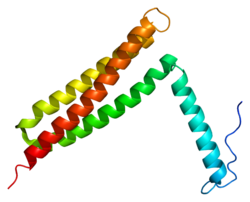
PTK2

PTK2 protein tyrosine kinase 2 (PTK2), also known as focal adhesion kinase (FAK), is a protein that, in humans, is encoded by the PTK2 gene. PTK2 is a focal adhesion-associated protein kinase involved in cellular adhesion (how cells stick to each other and their surroundings) and spreading processes (how cells move around). It has been shown that when FAK was blocked, breast cancer cells became less metastatic due to decreased mobility.4Q9S, 1K04, 1K05, 1MP8, 1OW6, 1OW7, 1OW8, 2ETM, 2IJM, 3B71, 3BZ3, 3PXK, 3S9O, 4EBV, 4EBW, 4GU6, 4GU9, 4I4E, 4I4F, 4K8A, 4K9Y, 4KAB, 4KAO, 4NY0574714083n/aENSMUSG00000022607Q05397P34152NM_001199649NM_005607NM_153831NM_001316342NM_001130409NM_007982NM_001358045NM_001358046NP_001339624NP_001339625NP_001339626NP_001339627NP_001339628NP_001339629NP_001339630NP_001339631NP_001339632NP_001339633NP_001339634NP_001339635NP_001339636NP_001339637NP_001339638NP_001339639NP_001339640NP_001339641NP_001339642NP_001339643NP_001339644NP_001339645NP_001339646NP_001339647NP_001339648NP_001339649NP_001339650NP_001339651NP_001339652NP_001339653NP_001339654NP_001339655NP_001339656NP_001339657NP_001339658NP_001339659NP_001339660NP_001339661NP_001339662NP_001339663NP_001339664NP_001339665NP_001339666NP_001339667NP_001339668NP_001339669NP_001339670NP_001339671NP_001339672NP_001339673NP_001339674NP_001339675NP_001339676NP_001339677NP_001339678NP_001339679NP_001339680NP_001339681NP_001123881NP_032008NP_001344974NP_001344975This gene encodes a cytosolic protein tyrosine kinase that is found concentrated in the focal adhesions that form among cells attaching to extracellular matrix constituents. The encoded protein is a member of the FAK subfamily of protein tyrosine kinases that included PYK2, but lacks significant sequence similarity to kinases from other subfamilies. It also includes a large FERM domain.FAK is phosphorylated in response to integrin engagement, growth factor stimulation, and the action of mitogenic neuropeptides. Integrin receptors are heterodimeric transmembrane glycoproteins that cluster upon ECM engagement, leading to FAK phosphorylation and recruitment to focal adhesions. FAK activity can also be attenuated by expression of its endogenous inhibitor known as FAK-related nonkinase (FRNK). This is a truncated protein consisting of only the carboxyl-terminal noncatalytic domain of FAK.During early apoptotic signaling in human endothelial cells, FAK is cleaved by caspase 3 at Asp-772, generating two FAK fragments of approximately 90 and 130 kDa in length. The smaller FAK fragment is termed 'killer FAT' and becomes the domain associated with death signaling. Throughout apoptosis, FAK is an important contributor to cell rounding, loss of focal contacts and apoptotic membrane formations such as blebbing, which involves contracting the cortical actin ring and is followed by chromatin condensation and nuclear fragmentation. Overexpression of FAK leads to inhibition of apoptosis and an increase in the prevalence of metastatic tumors.Focal adhesion kinase has four defined regions, or tertiary structure domains. Two of these domains, the N-terminal FERM domain and the Kinase domain form an auto-inhibitory interaction. This interaction—thought to be the result of hydrophobic interactions between the two domains—prevents the activation of the Kinase domain, thereby preventing the signalling function of FAK. Release of this auto-inhibitory interaction has been shown to occur within focal adhesions—but not in the cytoplasm—and therefore is thought to require interaction with focal adhesion proteins, potentially as a result of mechanical forces transmitted through the focal adhesion.FAK mRNA levels are elevated in ~37% of serous ovarian tumors and ~26% of invasive breast cancers, and in several other malignancies.Because of the involvement of FAK in many cancers, drugs that inhibit FAK are being sought and evaluated, e.g. in 2012: PF-573,228 (PF-228), PF-562,271 (PF-271), NVP-226, Y15 (1,2,4,5-benzenetetraamine tetrahydrochloride), and PND-1186,PTK2 has been shown to interact with:
